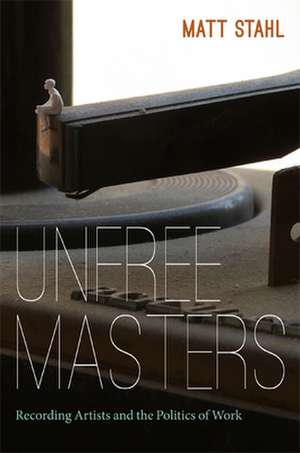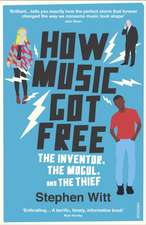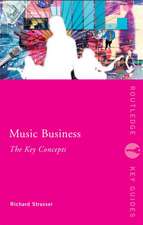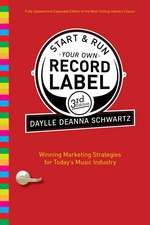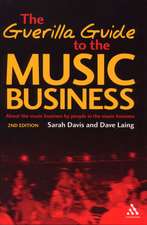Unfree Masters – Popular Music and the Politics of Work: Refiguring American Music
Autor Matt Stahlen Limba Engleză Paperback – 20 noi 2012
Din seria Refiguring American Music
-
 Preț: 159.67 lei
Preț: 159.67 lei -
 Preț: 193.37 lei
Preț: 193.37 lei -
 Preț: 241.55 lei
Preț: 241.55 lei -
 Preț: 173.87 lei
Preț: 173.87 lei -
 Preț: 197.93 lei
Preț: 197.93 lei -
 Preț: 149.76 lei
Preț: 149.76 lei -
 Preț: 176.27 lei
Preț: 176.27 lei -
 Preț: 175.26 lei
Preț: 175.26 lei -
 Preț: 157.59 lei
Preț: 157.59 lei -
 Preț: 168.76 lei
Preț: 168.76 lei -
 Preț: 166.35 lei
Preț: 166.35 lei -
 Preț: 160.40 lei
Preț: 160.40 lei -
 Preț: 130.46 lei
Preț: 130.46 lei -
 Preț: 231.12 lei
Preț: 231.12 lei -
 Preț: 262.32 lei
Preț: 262.32 lei -
 Preț: 263.47 lei
Preț: 263.47 lei -
 Preț: 258.50 lei
Preț: 258.50 lei -
 Preț: 262.32 lei
Preț: 262.32 lei -
 Preț: 306.77 lei
Preț: 306.77 lei -
 Preț: 264.82 lei
Preț: 264.82 lei -
 Preț: 195.18 lei
Preț: 195.18 lei -
 Preț: 305.46 lei
Preț: 305.46 lei -
 Preț: 305.08 lei
Preț: 305.08 lei -
 Preț: 302.19 lei
Preț: 302.19 lei -
 Preț: 238.51 lei
Preț: 238.51 lei -
 Preț: 298.50 lei
Preț: 298.50 lei - 23%
 Preț: 775.73 lei
Preț: 775.73 lei -
 Preț: 304.31 lei
Preț: 304.31 lei -
 Preț: 237.63 lei
Preț: 237.63 lei -
 Preț: 264.82 lei
Preț: 264.82 lei -
 Preț: 245.82 lei
Preț: 245.82 lei -
 Preț: 268.09 lei
Preț: 268.09 lei -
 Preț: 261.38 lei
Preț: 261.38 lei
Preț: 263.29 lei
Nou
Puncte Express: 395
Preț estimativ în valută:
50.39€ • 52.28$ • 42.11£
50.39€ • 52.28$ • 42.11£
Carte tipărită la comandă
Livrare economică 17-31 martie
Preluare comenzi: 021 569.72.76
Specificații
ISBN-13: 9780822353430
ISBN-10: 0822353431
Pagini: 304
Dimensiuni: 158 x 234 x 22 mm
Greutate: 0.43 kg
Editura: MD – Duke University Press
Seria Refiguring American Music
ISBN-10: 0822353431
Pagini: 304
Dimensiuni: 158 x 234 x 22 mm
Greutate: 0.43 kg
Editura: MD – Duke University Press
Seria Refiguring American Music
Recenzii
"Unfree Masters is an informative, intellectually engaging book. What really impressed me is how much I learned about copyright law, recording contracts, and music industry labor practicessubjects I thought I already knew a great deal about." Kembrew McLeod, co-author of Creative License: The Law and Culture of Digital Sampling
"What makes Unfree Masters so significant is the fact that public struggles between musicians and the recording industry play out in less visible ways across all fields of employment. This is not simply a work of popular music studies. It is a major critique of the dominant relations between labor and capital in a postindustrial economy." Barry Shank, co-editor of The Popular Music Studies Reader
"Here is a book that does several things at once. It explains the current status of recording artists, both as subordinated employees and as free entrepreneurs who license rights to intellectual property, namely their music compositions and recordings. It also shows how, from the standpoint of labour politics, these cultural workers are not so different from other workers in a neoliberal political economy: competing individually while dreaming of autonomy, and contractually tied to a record company that snaps up their creative output for exploitation and keeps them indebted while offering little security.... Unfree Masters extends its focus beyond US recording artists to a detailed critique of the neoliberalisation of the workplace, arguing that financialisation causes high unemployment, in turn enhancing individualisation and casualisation at work, which allows employers to demand more and give less. Stahl shows that "the marginal status of present-day popular musicians enables them to serve as a lens through which we may perceive otherwise obscure truths about our own economic and cultural systems", in which the notion of liberal democracy seems like an oxymoron."--Hillegonda Rietveld, Times Higher Education, February 7th 2013
"Unfree Masters is an informative, intellectually engaging book. What really impressed me is how much I learned about copyright law, recording contracts, and music industry labor practices - subjects I thought I already knew a great deal about." Kembrew McLeod, co-author of Creative License: The Law and Culture of Digital Sampling "What makes Unfree Masters so significant is the fact that public struggles between musicians and the recording industry play out in less visible ways across all fields of employment. This is not simply a work of popular music studies. It is a major critique of the dominant relations between labor and capital in a postindustrial economy." Barry Shank, co-editor of The Popular Music Studies Reader "Here is a book that does several things at once. It explains the current status of recording artists, both as subordinated employees and as free entrepreneurs who license rights to intellectual property, namely their music compositions and recordings. It also shows how, from the standpoint of labour politics, these cultural workers are not so different from other workers in a neoliberal political economy: competing individually while dreaming of autonomy, and contractually tied to a record company that snaps up their creative output for exploitation and keeps them indebted while offering little security... Unfree Masters extends its focus beyond US recording artists to a detailed critique of the neoliberalisation of the workplace, arguing that financialisation causes high unemployment, in turn enhancing individualisation and casualisation at work, which allows employers to demand more and give less. Stahl shows that "the marginal status of present-day popular musicians enables them to serve as a lens through which we may perceive otherwise obscure truths about our own economic and cultural systems", in which the notion of liberal democracy seems like an oxymoron."--Hillegonda Rietveld, Times Higher Education, February 7th 2013
"What makes Unfree Masters so significant is the fact that public struggles between musicians and the recording industry play out in less visible ways across all fields of employment. This is not simply a work of popular music studies. It is a major critique of the dominant relations between labor and capital in a postindustrial economy." Barry Shank, co-editor of The Popular Music Studies Reader
"Here is a book that does several things at once. It explains the current status of recording artists, both as subordinated employees and as free entrepreneurs who license rights to intellectual property, namely their music compositions and recordings. It also shows how, from the standpoint of labour politics, these cultural workers are not so different from other workers in a neoliberal political economy: competing individually while dreaming of autonomy, and contractually tied to a record company that snaps up their creative output for exploitation and keeps them indebted while offering little security.... Unfree Masters extends its focus beyond US recording artists to a detailed critique of the neoliberalisation of the workplace, arguing that financialisation causes high unemployment, in turn enhancing individualisation and casualisation at work, which allows employers to demand more and give less. Stahl shows that "the marginal status of present-day popular musicians enables them to serve as a lens through which we may perceive otherwise obscure truths about our own economic and cultural systems", in which the notion of liberal democracy seems like an oxymoron."--Hillegonda Rietveld, Times Higher Education, February 7th 2013
"Unfree Masters is an informative, intellectually engaging book. What really impressed me is how much I learned about copyright law, recording contracts, and music industry labor practices - subjects I thought I already knew a great deal about." Kembrew McLeod, co-author of Creative License: The Law and Culture of Digital Sampling "What makes Unfree Masters so significant is the fact that public struggles between musicians and the recording industry play out in less visible ways across all fields of employment. This is not simply a work of popular music studies. It is a major critique of the dominant relations between labor and capital in a postindustrial economy." Barry Shank, co-editor of The Popular Music Studies Reader "Here is a book that does several things at once. It explains the current status of recording artists, both as subordinated employees and as free entrepreneurs who license rights to intellectual property, namely their music compositions and recordings. It also shows how, from the standpoint of labour politics, these cultural workers are not so different from other workers in a neoliberal political economy: competing individually while dreaming of autonomy, and contractually tied to a record company that snaps up their creative output for exploitation and keeps them indebted while offering little security... Unfree Masters extends its focus beyond US recording artists to a detailed critique of the neoliberalisation of the workplace, arguing that financialisation causes high unemployment, in turn enhancing individualisation and casualisation at work, which allows employers to demand more and give less. Stahl shows that "the marginal status of present-day popular musicians enables them to serve as a lens through which we may perceive otherwise obscure truths about our own economic and cultural systems", in which the notion of liberal democracy seems like an oxymoron."--Hillegonda Rietveld, Times Higher Education, February 7th 2013
Notă biografică
Descriere
Asserts that the labor issues in the music industry can stimulate insights about the political-economic and imaginative challenges currently facing working people of all kinds
